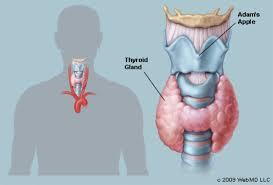
- posted: Mar. 01, 2021
Thyroid Disease and Diabetes
By Gary Gilles Medically reviewed by Do-Eun Lee, MD on July 03, 2020
It's not uncommon for someone to have both thyroid disease and diabetes. In fact, if you have type 1 diabetes, type 2 diabetes, insulin resistance, or metabolic syndrome, your risk of developing thyroid disease is increased. And thyroid disease increases your risk of developing metabolic syndrome or type 2 diabetes. This association is even stronger if you are overweight or obese.1
It's important, then, to make sure you undergo routine screening for diabetes if you have thyroid disease, and vice versa, to ensure early detection and timely treatment. When one of the conditions is poorly controlled, it can make management of the other condition and reducing your risk of complications more difficult.
There are also few steps you can take to help reduce your risk of this double diagnosis.
Thyroid Disease and Blood Sugar
Your thyroid gland and thyroid hormones play a major role in regulating many of your body's biological processes, such as growth, development, and metabolism.2 Because thyroid disease interferes with metabolism, it can alter your blood sugar. This increases your risk of developing diabetes, and it makes it harder to manage your blood sugar if you already have diabetes.
Hyperthyroidism, which is overactive thyroid hormone, and hypothyroidism, which is underactive thyroid hormone, are both associated with mild hyperglycemia (elevated glucose levels).1
You might not experience obvious symptoms of thyroid-induced hyperglycemia if you do not have diabetes because your insulin can regulate your blood sugar to get it near optimal levels.
It is believed that the chronically high blood sugar that can be induced by thyroid disease may contribute to the development of metabolic syndrome, a pre-diabetic state. Untreated metabolic syndrome can progress to type 2 diabetes.3
Thyroid Disease and Insulin
Diabetes can cause alterations in thyroid hormone levels. Insulin imitates the actions of thyroid hormones in some tissues of the body, which decreases the production of thyroid hormones. But insulin also functions in the opposite way thyroid hormones do in other tissues, which increases thyroid hormone levels.4
Excess or deficient insulin can induce changes in thyroid hormone production and activity.
Looking at the association from another direction, the metabolic changes of thyroid disease can interfere with the effects of insulin, whether endogenous (produced by your body) or taken as a medical treatment for diabetes.
Hyperthyroidism increases metabolism and can cause insulin to be processed and eliminated from the body more quickly than normal.5 Some people with type 1 diabetes who are also diagnosed with hyperthyroidism may need to take higher doses of insulin until thyroid hormones are stabilized.
When metabolism is slowed in hypothyroidism, insulin may linger longer in the body, causing a greater risk of hypoglycemia (low glucose levels). Hypothyroidism has also been associated with an increased sensitivity to insulin, which can contribute to hypoglycemia.6
It’s important that you discuss all adjustments in your prescribed insulin dose with your doctor, if applicable
Hypothalamic-Pituitary Axis
There is a cycle of interaction and feedback between the hypothalamus, the pituitary gland, the adrenal gland, the thyroid gland, and insulin. Adrenal hormones, along with thyroid hormones and the hormones of the pancreas (insulin and glucagon), all work together to regulate metabolism. The hypothalamus and pituitary gland respond by stimulating or inhibiting all of these.
When insulin, thyroid hormones, or the steroid hormones of the adrenal gland are off-balance, the others often increase or decrease as a means of compensating for the metabolic dysfunction. This interaction is believed to play a role in the relationship between thyroid disease and diabetes.
Prevention and Management
If you have already been diagnosed with thyroid disease or diabetes, weight management is considered among the most effective strategies for the prevention of the other condition.
Maintaining close control over your glucose and thyroid hormone levels can help prevent diabetes if you have thyroid disease. And maintaining optimal glucose levels can reduce your chances of developing thyroid disease if you have diabetes.
If you have low insulin or insulin resistance, thyroid disease can make your blood glucose levels fluctuate more than usual and become harder to manage. Optimal control of thyroid hormone levels and glucose levels with medication and diet is vital to preventing the long-term complications of both of these conditions.
Chiropractic and Nutritional Care in Los Alamitos by Dr. Steven B. Wasserman, a local Chiropractor can provide a consultation to identify the source your problem and a treatment plan. Call us at 562-430-4949 for an appointment.
Locations
3772 Katella Ave. Suite 100
Los Alamitos, CA 90720, US
Office Hours
Los Alamitos Office
8:00 am - 12:00 pm
2:30 pm - 6:00 pm
Closed
8:00 am - 12:00 pm
2:30 pm - 6:00 pm
Closed
8:00 am - 12:00 pm
2:30 pm - 5:00 pm
Closed
Closed

